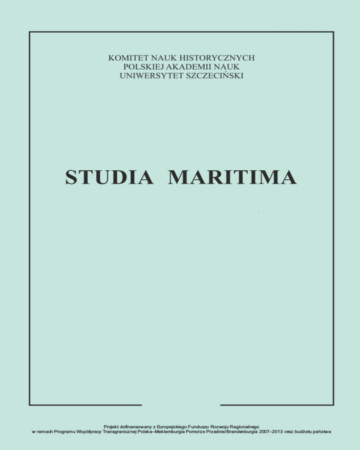






| Authors: |
Krzysztof
Kubiak
Uniwersytet Jana Kochanowskiego w Kielcach |
| Keywords: | Iceland Great Britain fisheries conflict cod wars |
| Data publikacji całości: | 2017 |
| Page range: | 31 (191-221) |
| 1. | Źródła opublikowane |
| 2. | Agreement Between the United States and the Republic of Iceland, May 5, 1951. http://avalon.law.yale.edu/20th_century/ice001.asp. |
| 3. | Board of Trade: Committee of Enquiry into Trawler Safety: Papers, Convention Between Her Majesty, The German Emperor, King of Prussia, The King of The Belgians, The King of Denmark, The President of The French Republic, and The King of The Netherlands, for Regulating The Police of The North Sea Fisheries. http://iea.uoregon.edu/pages/view_treaty.php?t=1882-PoliceNorthSeasFishery.EN.txt. |
| 4. | „Final Act of the European Fisheries Conference. London, December 3, to March 2, 1964”. American Journal of International Law 58 (1964), 4: 1068–1081. |
| 5. | Law No. 44 concerning the scientific conservation of the continental shelf fisheries, 1948. http://faolex.fao.org/docs/pdf/ice40717.pdf. |
| 6. | Proclamation 2667 of September 28, 1945. Policy of the United States with Respect to the National Resources of the Subsoil and Sea Bed of the Continental Shelf. http://www.oceancommission.gov/documents/gov_oceans/truman.pdf. |
| 7. | Proclamation 2668 of September 28, 1945. Policy of the United States with Respect to Coastal Fisheries in Certain Areas of the High Seas. http://cil.nus.edu.sg/1945/1945-us-presidential-proclamation-no-2668-policy-of-the-united-states-with-respect-tocoastal-fisheries-in-certain-areas-of-the-high-seas/. |
| 8. | Trawlermen’s compensation scheme: Eligibility criteria and procedure for making claims. http://www.ombudsman.org.uk/improving-public-service/reports-and-consultations/reports/parliamentary/put-together-in-haste-cod-wars-trawlermenscompensation-scheme/14. |
| 9. | Opracowania |
| 10. | Bergmann, Eiríkur. „Sense of Sovereignty: How national sentiments have influenced Iceland’s European Policy”. Icelandic Review of Politics & Administration 5 (2009), 2: 205–223. |
| 11. | Bierzanek, Remigiusz. Morze otwarte ze stanowiska prawa międzynarodowego. Warszawa:Państwowe Wydawnictwo Naukowe, 1969. |
| 12. | Binkowski, Henryk. Islandia. Informator. Toruń: Adam Marszałek, 1995. |
| 13. | Clausewitz, Carl von. O wojnie. Lublin: Wydawnictwo Test, 1995. |
| 14. | Creed, Rupert. Turning the Tide: The 1968 Trawler Tragedy and the Wives’ Campaign for Safety. Hull: Back Door Press, 1998. |
| 15. | Duke, Simon W. United States Military Forces and Installations in Europe. Oxford: Oxford University Press, 1989. |
| 16. | Evans, Andrew, Iceland. Guilford: The Globe Pequot Press, 2010. |
| 17. | Finley, Mary C. „The Tragedy of Enclosure, Fish, Fisheries Science and U.S. Foreign Policy, 1920–1960”. Dysertacja doktorska, San Diego: University of California, 2007. |
| 18. | Fitz, Ryszard. Depesze z Reykjaviku. Warszawa: Krajowa Agencja Wydawnicza, 1974. |
| 19. | Flintham, Victor. High Stakes. Britain’s Air Arms in Action 1945–1990. Barnsley: Pen & Sword Aviaton, 2009. |
| 20. | Fulton, Thomas W. The Sovereignty of the Sea. An Historical Account of the Claims of England to the Dominion of the British Seas, and of the Evolution of the Waters, with Special Reference to the Rights of Fishing and the Naval Salute. Union: Lawbook Exchange, 2002. |
| 21. | Goetel, Ferdynand. Wyspa na chmurnej północy. Warszawa 1928. |
| 22. | Jónsson, Albert. Iceland, NATO and the Keflavik Base. Reykjavik 1989. |
| 23. | Kubiak, Krzysztof. „Brytyjsko-islandzka „wojna dorszowa”. Przegląd Morski (1996), 7–8: 40–52. |
| 24. | Kubiak, Krzysztof. „Pogromca fregat z Gdyni” Odkrywca (2013), 4: 37–38. |
| 25. | Kubiak, Krzysztof. „Trawlery przeciwko fregatom, czyli jak Islandczycy upokorzyli Royal Navy”. Morze, Statki i Okręty (2013), 5: 64–71. |
| 26. | Kurlansky, Mark. Dorsz. Ryba która zmieniła świat. Warszawa: Twój Styl, 2004. |
| 27. | Majewski, Aleksander. Oceany i morza. Warszawa: Wydawnictwo Naukowe PWN, 1992. |
| 28. | Makowski Andrzej. Siły morskie współczesnego państwa. Gdynia: Impuls Plus Consulting, 2000. |
| 29. | Mitchell, Bruce. „Politics, Fish, and International Resource Management: The British–Icelandic Cod War”. Geographical Review 66 (1976), 2: 127–138. |
| 30. | Sigurðsson Guðjón Öre, „The Development of Icelandic Foreign Policy. From National Interest to Idealism?”. Praca licencjacka, Reykjavík: Háskóla Íslands, University of Iceland, 2012. |
| 31. | Symonides, Janusz. Nowe prawo morza, Warszawa: Państwowe Wydawnictwo Naukowe, 1986. |
| 32. | Szelągowska, Grażyna. „Od kolonii do państwa niepodległego. Islandia od XIII do XX wieku”. W: Islandia. Wprowadzenie do wiedzy o społeczeństwie i kulturze, red. |
| 33. | Roman Chymkowski, Włodzimierz K. Pessel, 31–44. Warszawa: Wydawnictwo Trio, 2009. |
| 34. | Thor, Jon T. British Trawlers in Icelandic Waters: History of British Steam Trawling of Iceland 1889–1916 and Anglo-Icelandic Dispute 1896–1897. Reykjavík: Fjölva, 1992. |
| 35. | Welch, Andrew. The Royal Navy in the Cod Wars. Britain and Iceland Conflict 1958–61,1972–73, 1975–76. Lodge Hill: Maritime Books, 2006. |
| 36. | Wszołek, Anna. „The Republic of Iceland within the NATO”. W: The Northern Space Contemporary Issue, red. Ryszard M. Czarny, Radosław Kubicki, Agnieszka Jankowska, Roman S. Czarny, 171–181. Warszawa–Kielce, 2012. |
| 37. | Źródła internetowe |
| 38. | Captured Trawlers. http://paperspast.natlib.govt.nz/cgi-bin/paperspast?a=d&d=NA19230529.2.46. |
| 39. | Cod War 1893. http://www.hullwebs.co.uk/content/l-20c/industry/fishing/cod-war/codwar-1893.htm. |
| 40. | Consolidated Fisheries Ltd. http://homepage.ntlworld.com/grimsby.trawlers/consolship1.htm. |
| 41. | History of the Cod Wars, Part 1. http://www.youtube.com/watch?v=qkZqi1wigEk&list=PLDDB04F186495435E&index=1 |
| 42. | Hull and Distant Water Fishing, Part One: The Rise of the Sidewinders. http://www.wilmatheater.org/blog/hull-and-distant-water-fishing-part-one-rise-sidewinders. |
| 43. | Iceland and World War II. http://members.shaw.ca/amacdona/icelwwii.htm. |
| 44. | Iceland. The World Factbook. https://www.cia.gov/library/publications/the-world-factbook/geos/ic.html. |
| 45. | Icelandic Defense Agency. http://www.globalsecurity.org/military/world/europe/is-ida.htm.Jóhannesson Gudni Thorlacius. „Troubled Waters. Cod War, Fishing Disputes, and Britain’s |
| 46. | Fight for the Freedom of the High Seas, 1948–1964” (PhD diss., University of London). https://qmro.qmul.ac.uk/xmlui/handle/123456789/1834. |
| 47. | Lord St. Vincent H 261. http://hulltrawler.net/Sidewinder/Vessel%20-%20Lord/LORD%20St%20VINCENT%20H261.htm. |
| 48. | M.V. Miranda. Trawler Support Vessel. http://nigelhadley.org.uk/page3.html. |
| 49. | News at ten running orders. http://jiscmediahub.ac.uk/mediaContent/open/scripts/1973/19730813_LE_01_ITV.pdf. |
| 50. | Orsino. http://www.hulltrawler.net/Stern/ORSINO%20H410.htm. |
| 51. | Othello H 389. http://www.hulltrawler.net/Stern/OTHELLO%20H389.htm. |
| 52. | Ranger Breiseis. http://www.poheritage.com/Content/Mimsy/Media/factsheet/9435RANGER-BRISEIS-1962pdf.pdf. |
| 53. | The dynamic climate of Iceland. https://notendur.hi.is//~oi/climate_in_iceland.htm. |
| 54. | World War II Casulaties. http://worldwar2-database.blogspot.com/2010/10/world-war-iicasualties.html. |